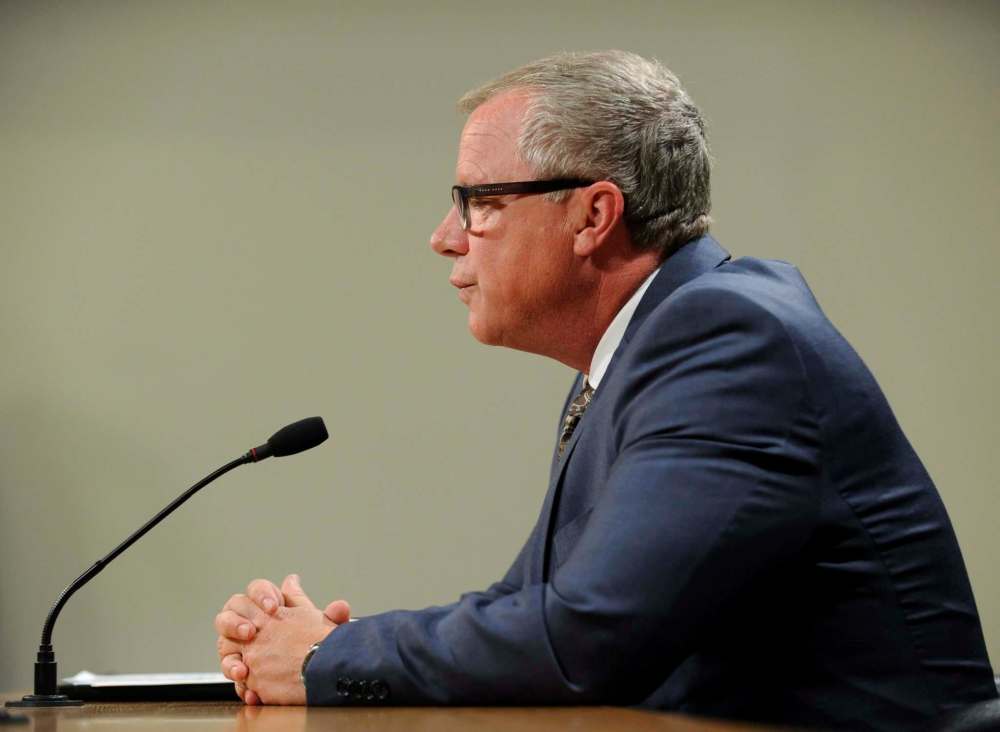Wall cuts his way right out of office
Advertisement
Read this article for free:
or
Already have an account? Log in here »
To continue reading, please subscribe:
Monthly Digital Subscription
$0 for the first 4 weeks*
- Enjoy unlimited reading on winnipegfreepress.com
- Read the E-Edition, our digital replica newspaper
- Access News Break, our award-winning app
- Play interactive puzzles
*No charge for 4 weeks then price increases to the regular rate of $19.95 plus GST every four weeks. Offer available to new and qualified returning subscribers only. Cancel any time.
Monthly Digital Subscription
$4.99/week*
- Enjoy unlimited reading on winnipegfreepress.com
- Read the E-Edition, our digital replica newspaper
- Access News Break, our award-winning app
- Play interactive puzzles
*Billed as $19.95 plus GST every four weeks. Cancel any time.
To continue reading, please subscribe:
Add Free Press access to your Brandon Sun subscription for only an additional
$1 for the first 4 weeks*
*Your next subscription payment will increase by $1.00 and you will be charged $16.99 plus GST for four weeks. After four weeks, your payment will increase to $23.99 plus GST every four weeks.
Read unlimited articles for free today:
or
Already have an account? Log in here »
Hey there, time traveller!
This article was published 15/08/2017 (3060 days ago), so information in it may no longer be current.
Saskatchewan Premier Brad Wall’s intuitive decision to step down one year and four months into a new mandate had some Saskatchewanians scratching their heads last week.
Others, like me, who understand the demanding electorate, observe that Wall had no other choice. It was either go now, or face leadership opposition within the Saskatchewan Party — or, even worse, humiliation at the polls in 2020.
This time last year, Wall — first elected in November 2007 — was riding high in the polls after the April 2016 election in which he received a majority mandate to govern for the next four years.

So what happened?
One unpopular budget and the Saskatchewan Party premier, a member of the Mennonite faith’s conservative wing, is folding up his evangelist’s tent and moving on like Steve Martin in Leap of Faith.
After the miserly April 2017 budget, Wall, who was once the most popular premier in Canada, watched on helplessly as his SaskParty approval ratings dipped to a record low of 40 per cent.
It was a small cut to the coffers and the elimination of the government-owned, money-draining Saskatchewan Transportation Company (STC) that left Wall stranded.
Outside the province’s major centres, if you want to get on the bus, Gus, or make a new plan, Stan, you’ll have to hitch a ride, Clyde, ’cause Uber doesn’t service rural Saskatchewan.
Wall’s rural stronghold of conservative seniors has evaporated, since those without driver’s licences and with city medical appointments can no longer ride the STC, which has been the lifeline for rural people since 1946. That senior demographic can no longer rally for Wall in Regina.
Sure, there was a literate outcry over the de-funding of libraries in that same ill-fated budget. But the library funding was soon restored… for just one more year. The funding structures will be re-evaluated in 2018 after a consultation with librarians.
When Wall and his government sharpened their pencils with this most recent budget, they made a massive miscalculation: the SaskParty didn’t spend money during a downturn.
Instead, the government punished the electorate with a philosophical budget that off-loaded the treasury’s shortfall onto voters. Wall’s ill-advised April budget was an act of fiscal conservatism, which was an attempt to bolster his credibility with his conservative base — a rookie move for a premier of almost 10 years.
Like other western Canadian resource-based provinces, Saskatchewan’s economy has been listing like an old navy destroyer. Perhaps Wall, who has always had a good grasp on the mood of the electorate, knows his party is facing imminent failure at the polls in 2020.
Still, it’s a kick in the teeth to the loyal voters who elected his SaskParty based on the reassurance that a moderate would be at the helm for four more years.
The majority of voters in this polarized province chose between two extremes: the socialist NDP and the free-enterprise SaskParty. There hasn’t been a Liberal premier since W. Ross Thatcher (1964-1971).
The so-called polarized major political parties are more alike then they’ll admit: both are dominated by prudish social conservatives who thrive on the status quo; nothing changes in Saskatchewan… not even the time zone.
Wall the populist knew this, so he assumed the position of the appearance of change, without any bold policies that would set off the stuffy electorate. His moderate stance endeared him to the voting majority while alienating the far-right factions of his party.
So it’s farewell to Brad Wall. His 2016 winning election platform of “Keeping Saskatchewan Strong” has been an epic fail. All it did was fortify the NDP, who are now poised to steal the province from the SaskParty, thanks to the erosion of Wall’s rural base.
So what are Brad Wall’s future career options? Open a surf shop in Tofino or sit on the board of PotashCorp? Will Brad and Tami Wall buy a Class A motorhome, become roadies and tour with their 22-year-old musician son, Colter, a rising blues-folk-Americana star in North America and Europe?
Perhaps Wall knew the voters were ready to run him, and his party, out on a rail. It’s the only other way out of town now that the STC has been cut. To drown their transportation sorrows, rural voters — thanks to a quasi-privatization scheme for liquor stores — can now buy a cheap bottle of Golden Wedding rye at the same hotel bar where the STC once stopped.
Patricia Dawn Robertson is an independent journalist in Wakaw, Sask.

